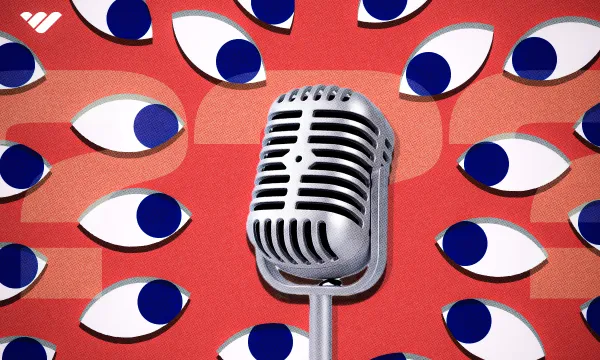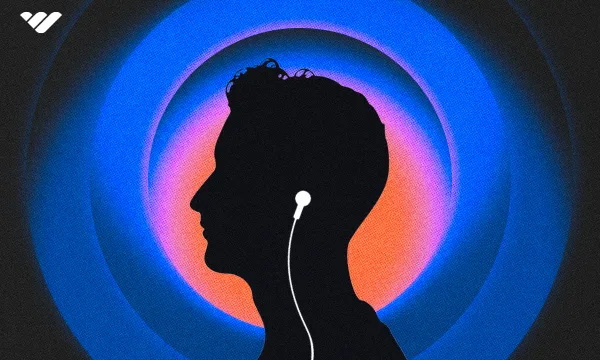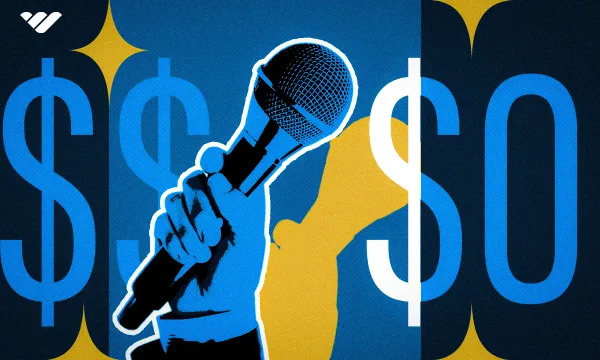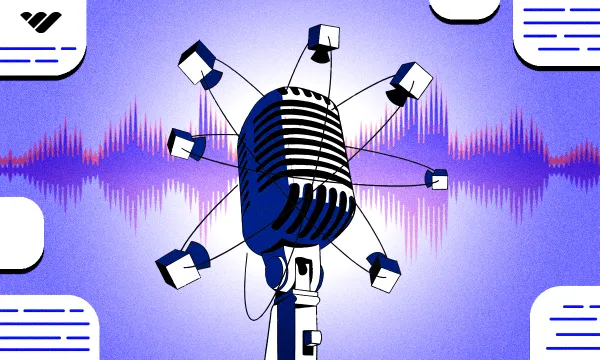Is everyone around you suddenly talking about becoming a creator online?
With the content creator economy already changing how people make money, it's no wonder that when others share their latest TikTok video or piece of art on Patreon, you also want a slice.
Seeing the success of others might have inspired you to start creating and sharing your own content on social media.
If you recently joined the creator bandwagon, it's time to stand out.
You do just that with a podcast. Up to 80% of Americans enjoy podcasts, which offer you a direct line to a captive audience ready for fresh content.
And, according to Adobe's Future of Creativity Monetization report, around 18% of content creators are in the podcast space, meaning there is still room for you to start a podcast.
So, if talking is your jam and you want to grow your side hustle income, let's unpack what a podcast is, how it works, and how you can monetize it.
What is a Podcast?

I'm sure you already know what a podcast is, but there is some nuance to it. A podcast is your personal digital broadcast.
You can create audio or video episodes – at home or in a studio – to engage with people anytime and anywhere. Whether you're sharing solo insights from your living room, engaging in banter with friends, or conducting interviews, each podcast is your vision and creation.
Podcasts are pre-recorded and uploaded to various platforms, where listeners can access them on demand. The medium seamlessly fits into daily routines – be it during a commute, a workout, or relaxation time.
Episodes can range from humorous to profound. All you need is a compelling idea, your voice, and some equipment to bring it to life.
Basic Podcast Terminology
Before we discuss how a podcast actually works, let's review some common terminology.
- Podcaster
A creator who produces and hosts audio content, engaging audiences with informative, entertaining, or inspiring episodes. They manage everything from topic selection to recording to editing and may be responsible for promoting their podcast. - Podcast host
This can be another name for podcaster, but it can also mean the podcast hosting service. This is an account where podcasters upload and publish their episodes. It helps distribute episodes to major platforms like Apple Podcasts and Spotify, making them accessible to a large audience. - Podcast episode
One show that is part of a series or season. A season can have 5, 10, 20, or more episodes. - Podcast network
A company that groups multiple podcasts, providing production support, marketing help, and automatic distribution. This enhances the quality and reach of each podcast within the network.
Why are Podcasts So Popular?
With approximately 509 million people listening to podcasts on the regular, their popularity is soaring - but why is that?
For starters, people learn new topics when listening to podcasts. They aren't always purely entertaining, but they are educational, too.
For example, the Niche Pursuits podcast, hosted by Jared Bauman and Spencer Haws, shares perspectives on recent Google updates and features interviews with industry experts Jessie Cunningham and Ben Rojas.
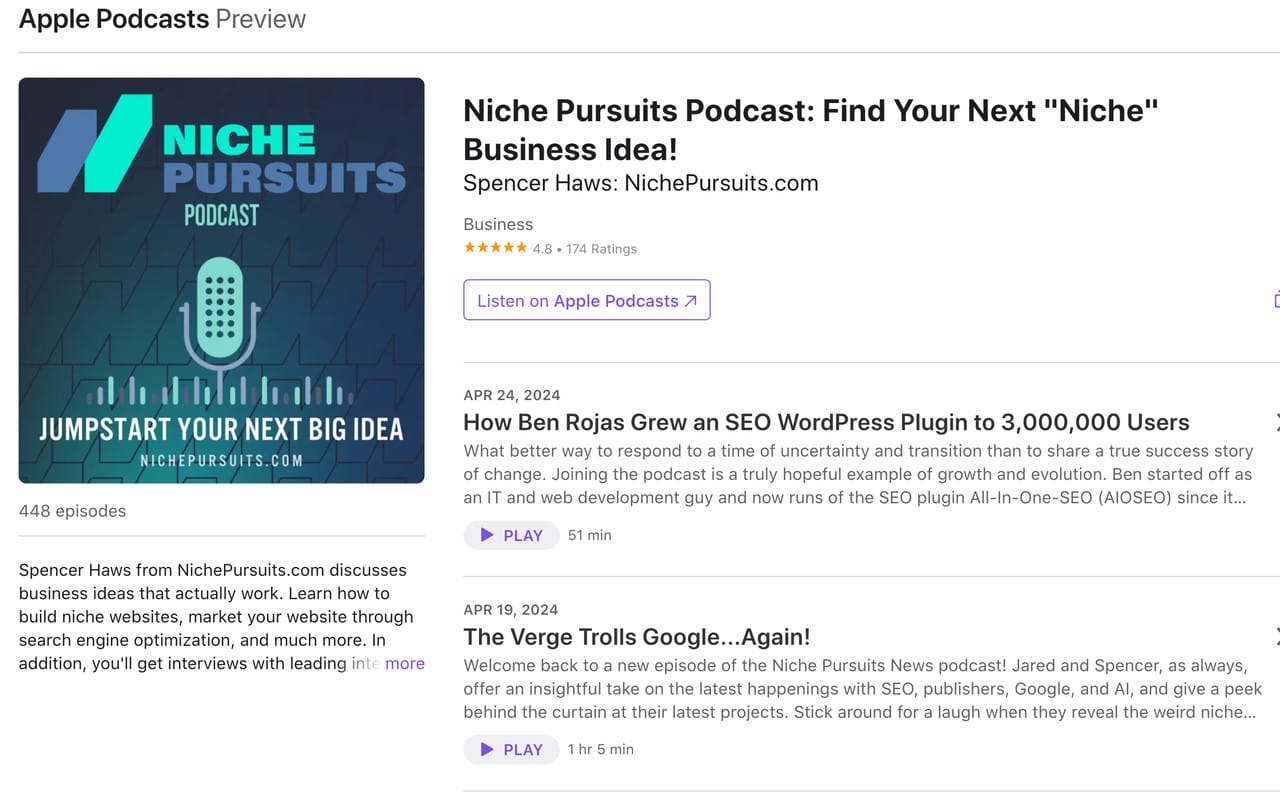
These podcast episodes offer firsthand experiences, helping entrepreneurs navigate changes and optimize their online strategies.
People also listen to podcasts and audio dramas happening in the media. I enjoy listening to the Out of the Pods podcast with Love is Blind, Deepti Vempati, and Natalie Lee.
The duo spill the tea on the recent seasons of Netflix's popular show Love is Blind and interview past reality stars like Brett Brown for more drama.
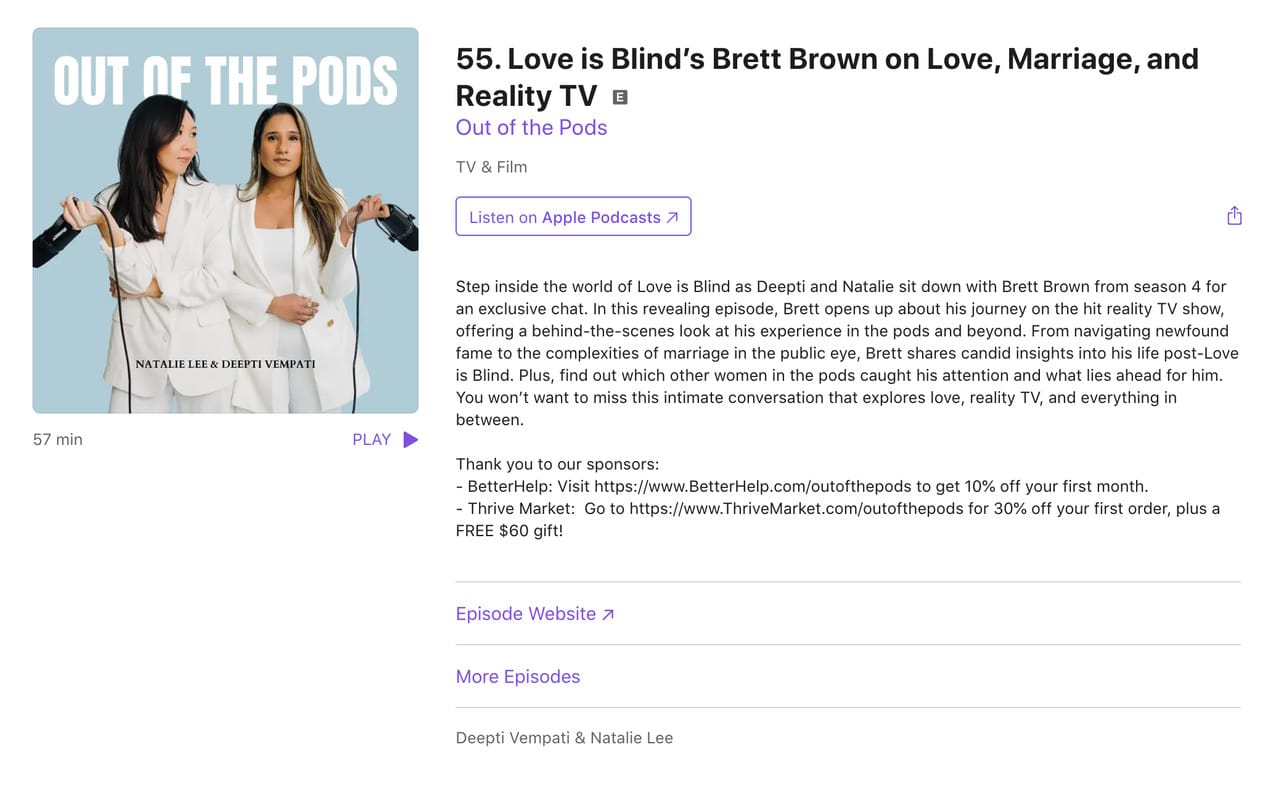
Another reason people tune in to podcasts is to get to know the cohosts. The dynamic between cohosts can be a major draw, as listeners often feel part of a conversation among friends.
For example, many people listen to the Sci Guys podcast to hear cohosts Corry and Luke share a strange scientific study while telling jokes.
Thirteen-year-old Evelyn can't get enough of the Sci Guys. "I love listening to the dynamics between you guys and I love the way Corry spends a long time collecting information on XYZ topics, and whichever guests are there derail the conversation."
People also listen to podcasts to hear the latest news stories worldwide. Many publications like The New York Times or Vox have podcasts that focus on curating gripping news stories for their audience.
Are Podcasts Audio or Visual?
While audio is the main format for podcasts, with the popularity of video, many podcasters also tape their show for a YouTube audience.
Doing this helps appeal to a larger audience and gives them the potential to earn ad income. It also helps when podcast topics need visual representation.
Different Types of Podcasts
Podcasts come in various themes, formats, and delivery styles. Let's look at five types of podcasts you can start.
1. Scripted Fiction Podcasts
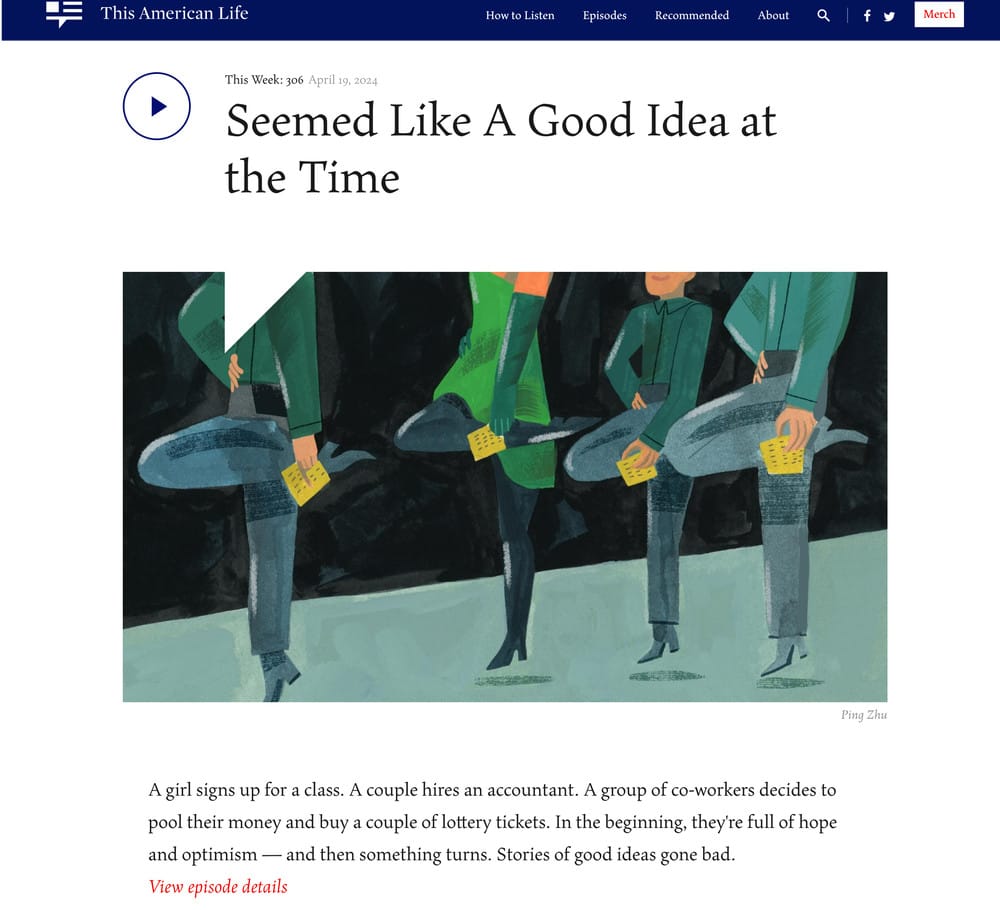
Scripted fiction podcasts are audio dramas that tell fictional stories through dialogue, sound effects, and music. They are performed by voice actors and follow a pre-written script.
Some scripted fiction podcasts resemble traditional radio dramas – like the Welcome to Night Vale podcast – while others are more like narrated stories with multiple characters – think This American Life podcast. Episodes can be short (20-25 minutes) for quick listening or long (45 minutes - 1 hour) for a more immersive experience.
2. Conversational Podcasts
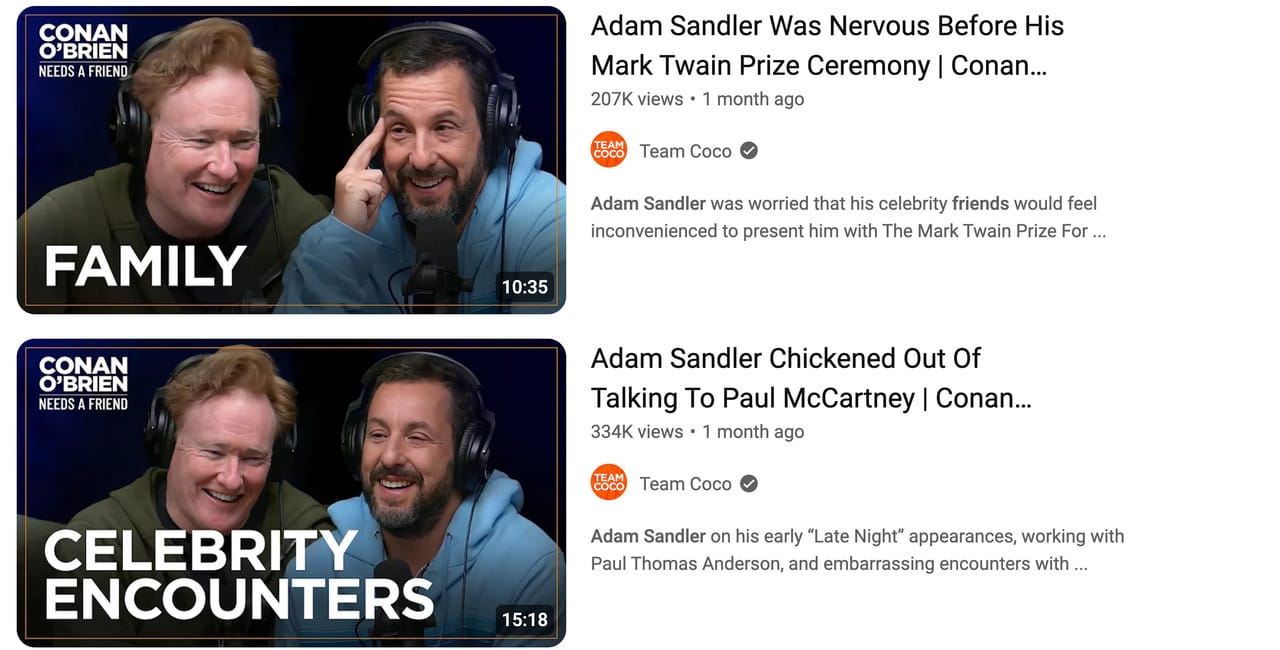
Conversational podcasts are a common type of podcast format. There are typically two podcasters engaging in a conversation or discussion about a variety of topics, ranging from daily life and personal experiences to specific interests like technology, politics, or culture.
A popular conversational podcast is Conan O'Brien Needs a Friend show. Talk Show host Conan O'Brien has entertaining conversations with big celebrities like Adam Sandler, Kristen Wiig and Dana Carvey.
This format often feels like listening in on a casual chat between friends, making it relatable and easy to follow for listeners.
3. Narrative Non Fiction Podcasts
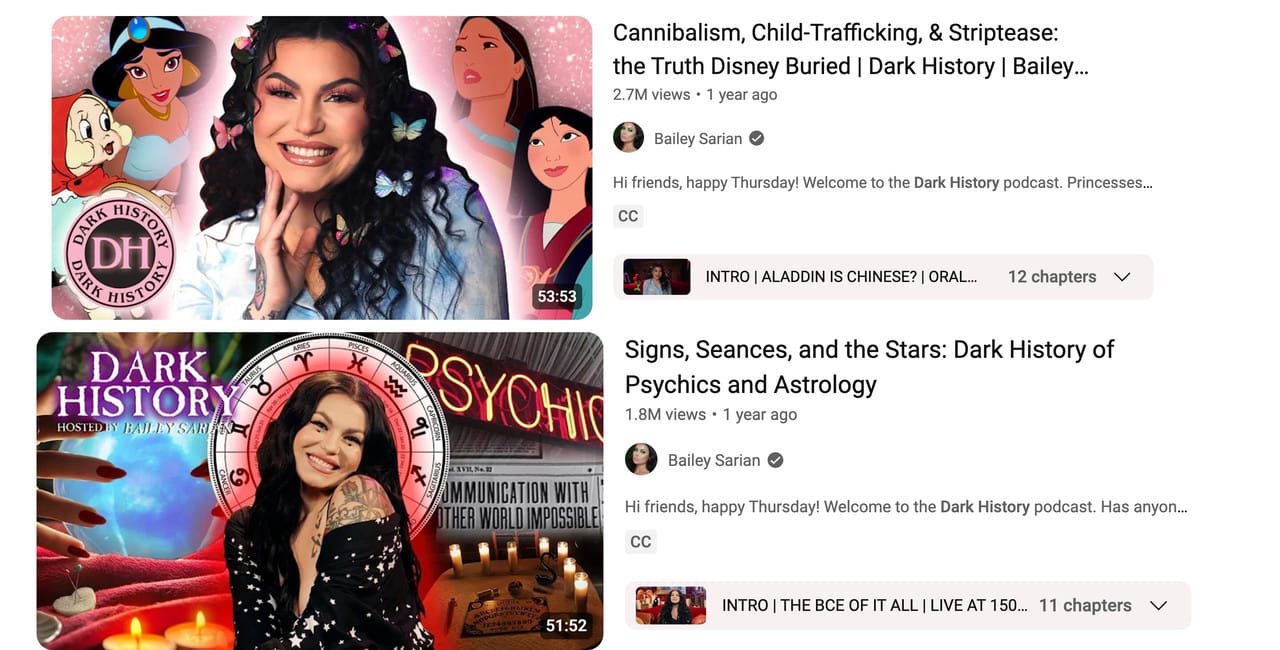
Narrative non-fiction podcasts tell true stories in a compelling and structured way. These podcasts take real-life events and present them through a full story arch, often incorporating clips, music, and sometimes scripted reenactments to enhance the listener's understanding and engagement.
One example of a narrative non fiction podcast is the Dark History podcast. Beauty YouTuber Bailey Sarian discovers the chilling dark stories of US and World History that aren't taught in school in her podcast.
4. Repurposed Content as Podcasts
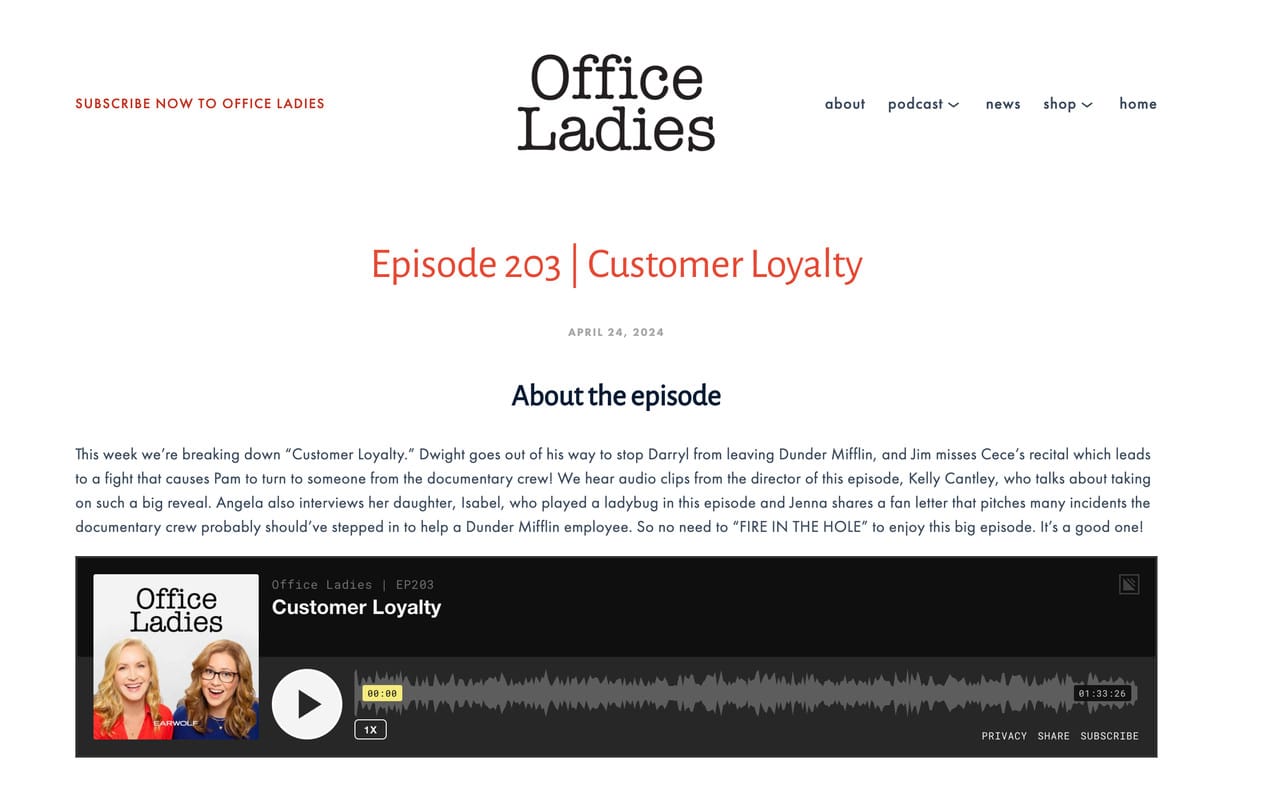
A simple way to leverage existing content is to repurpose it into a podcast. This strategy allows you to breathe new life into your previous works, such as blog posts, articles, or even video content, by presenting them in an audio format.
Transforming written content into a podcast can help reach a different audience that prefers listening over reading. It also offers an opportunity to expand on topics with further insights or updates, providing added value to your listeners.
One way to do this podcast format is to recap books or TV shows. In the Office Ladies podcast, The Office co-stars Jenna Fischer and Angela Kinsey break down episodes of The Office.
5 Examples of Popular Podcasts in 2024
Do you know what the #1 most popular podcast is? What about the second most popular?
Let's explore five examples of popular podcasts that have captured the attention of listeners around the world.
1. The Joe Rogan Experience: #1 podcast with 190 million downloads per month
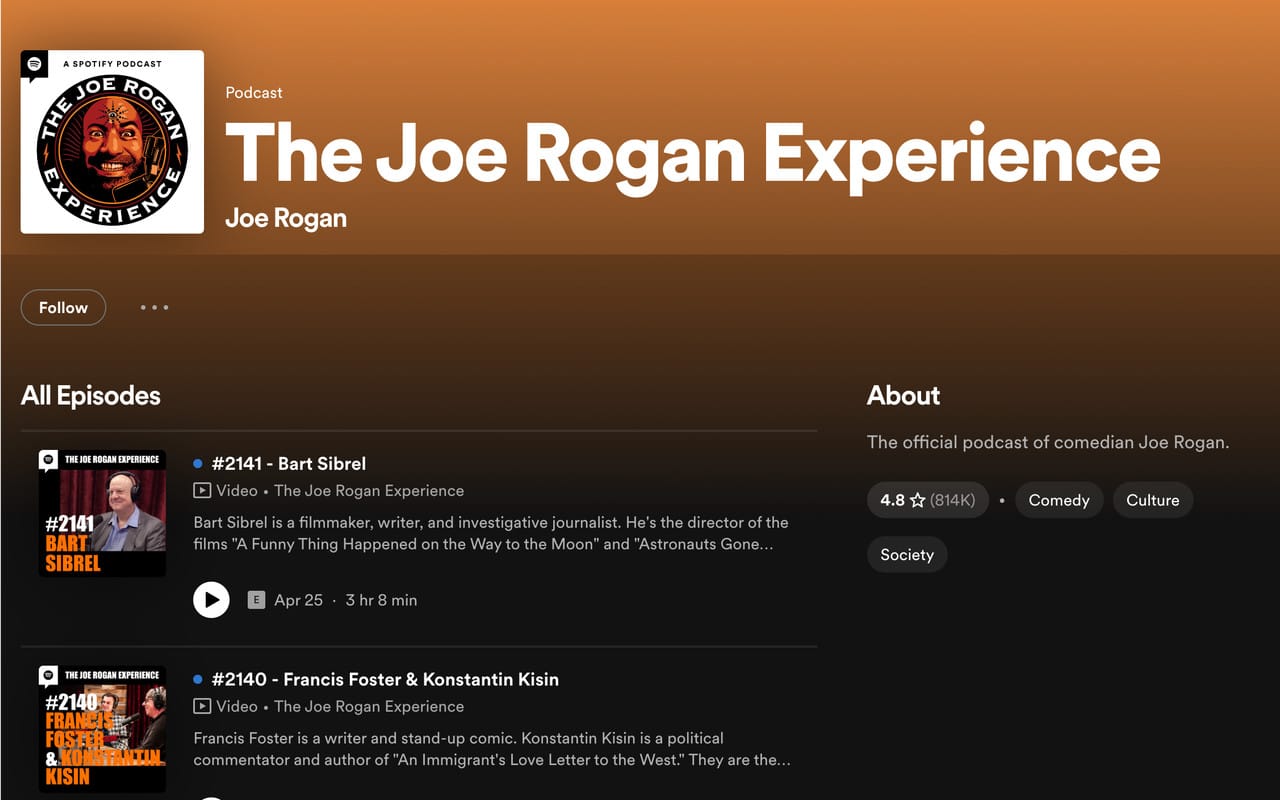
By far the most popular podcast in terms of downloads and income is The Joe Rogan Experience. It's hosted by UFC champion, comedian, and Fear Factor TV host, Joe Rogan.
This is a conversational podcast with long-form episodes on topics ranging from debunking science to highlighting pop culture phenomena to interviewing celebrities in music, sports, or comedy.
One of the most popular episodes occurred in 2018 when Joe Rogan invited Elon Musk to join the show. The 2.5-hour conversation was an instant hit and prompted Rogan to invite Musk back a couple of years later.
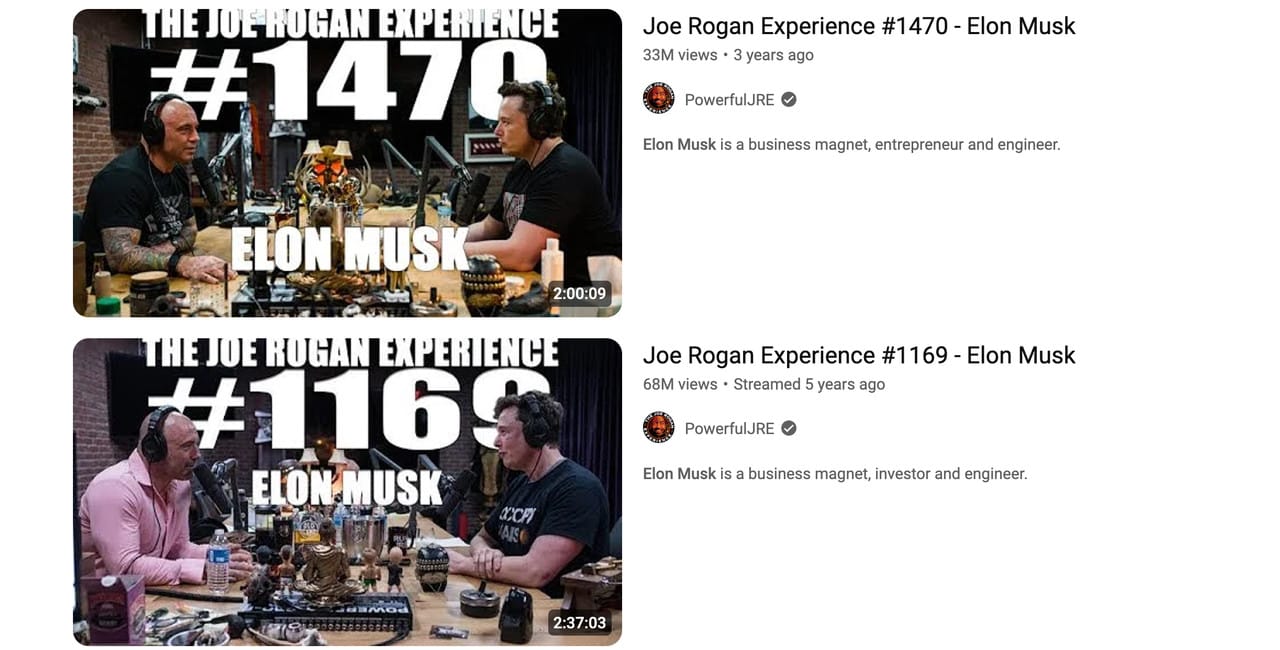
3. New Heights Podcast: Spotify's top sports podcast with 500,000 downloads per episode
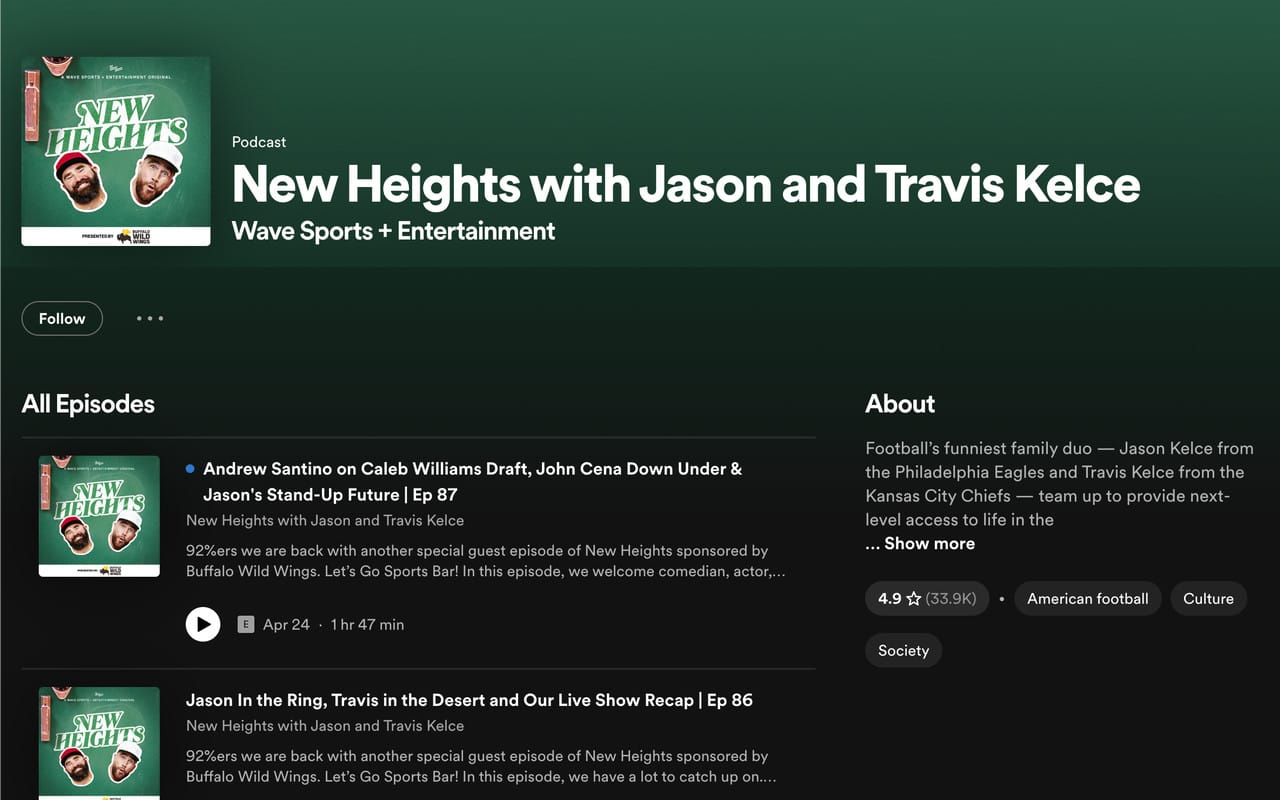
In their new podcast, Super Bowl champions and brothers Jason and Travis Kelce banter about their games and comment on trending NFL and sports headline stories. In an episode, you might also catch the occasional Taylor Swift and Travis Kelce relationship update. The podcast has recently branched out to interview famous sports celebrities like Arnold Schwarzenegger to reach a wider audience.

4. Call Her Daddy: #2 most popular podcast on Spotify with 2 million monthly downloads
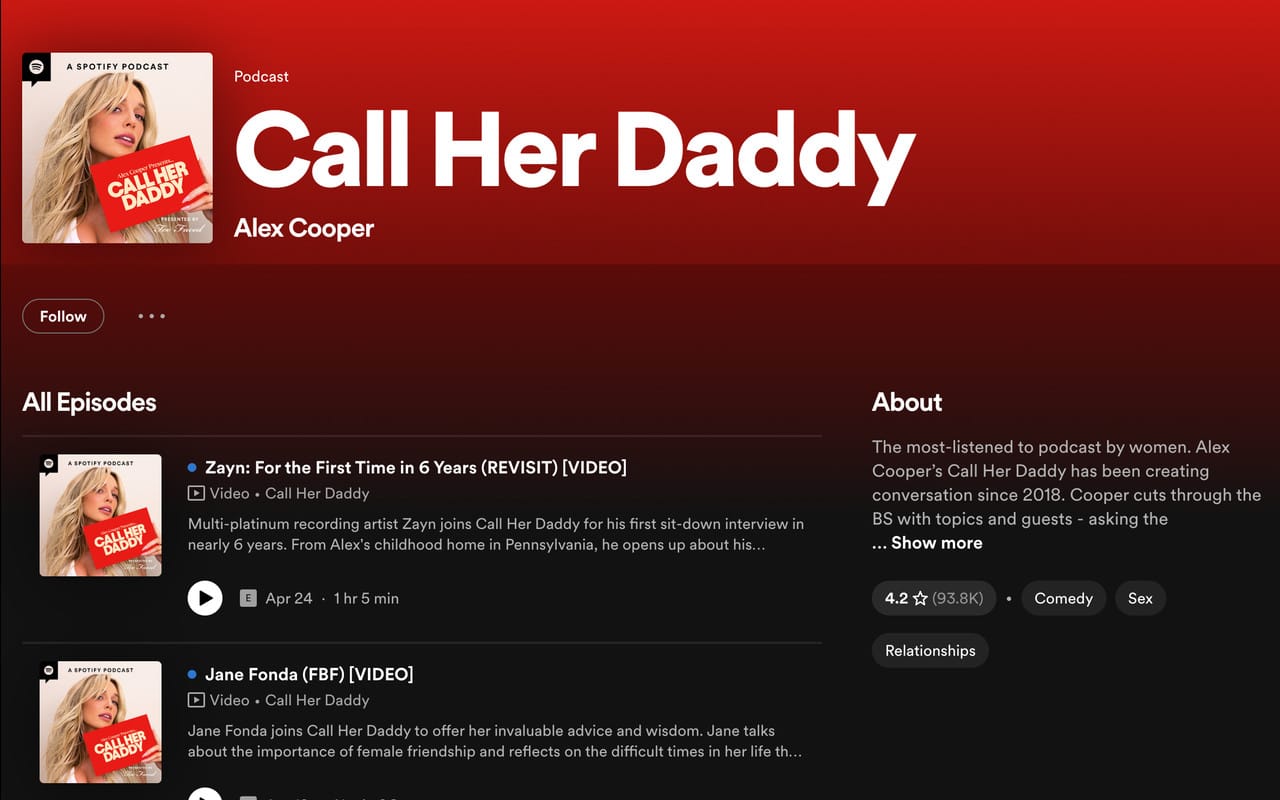
Call Her Daddy is a podcast mostly known for its candid discussions on relationships, sex, and dating, mixed with a humorous and unfiltered perspective from Alex Cooper.
Cooper shares stories, experiences, and advice, often with a raw and explicit edge that resonates with a young adult audience. Episodes frequently include interviews with celebrities and influencers. Her most notable Hollywood celebrity guests include Miley Cyrus, John Mayer, and Heidi Klum.

In 2021, Cooper signed a three-year deal with Spotify valued at over $60 million. According to Variety, this became the largest exclusive agreement for a female-led podcast on the platform.
5. Crime Junkie: #1 crime show in 2023 with over 1 billion downloads
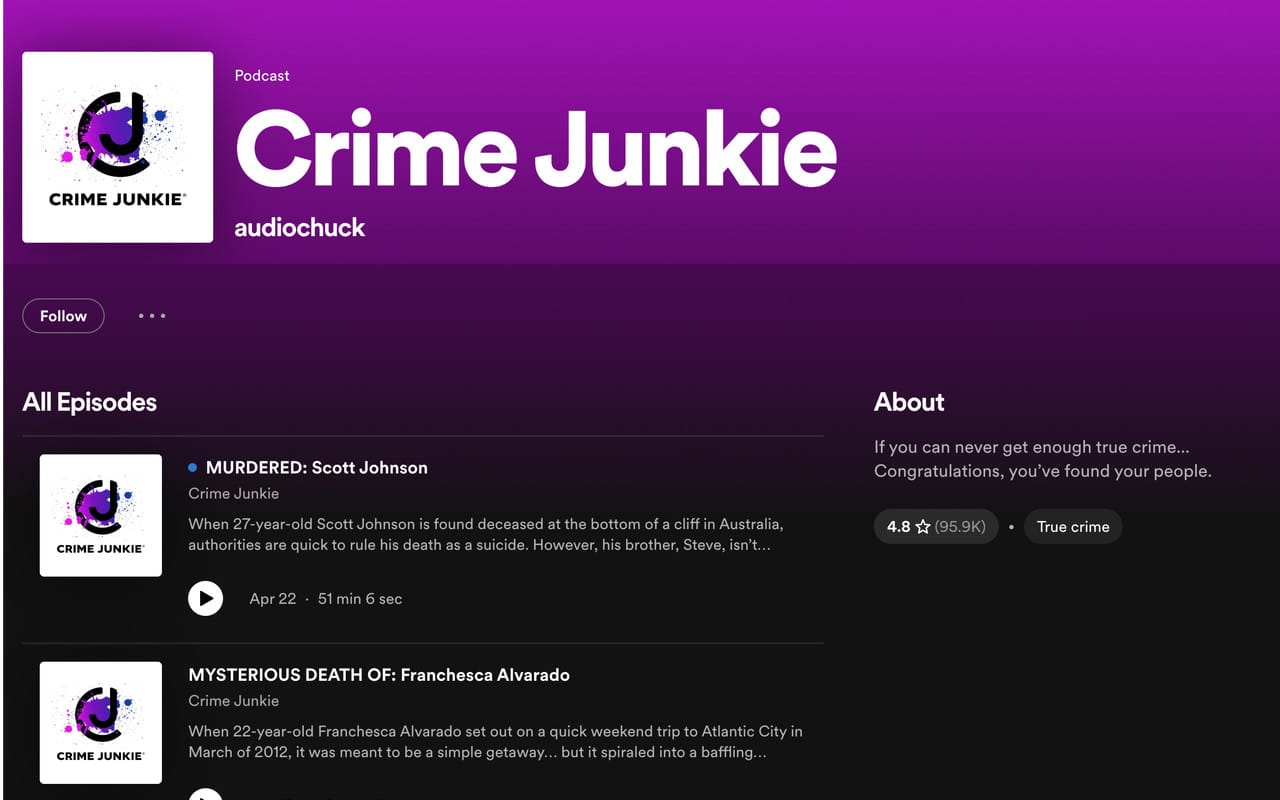
Crime Junkie is your go-to weekly true crime podcast, where hosts Ashley Flowers and Brit dive into both solved and unsolved cases every Monday.
They cover everything from murders and missing persons to serial killers and fugitives, presenting each story in a clear, relaxed, and informative style.
In October 2021, the Crime Junkie Network Audiochuck signed an exclusive multi-year ad sales deal with SiriusXM, giving them global rights to all Audiochuck podcasts, including popular shows like Crime Junkie and Anatomy of a Murder.
This opened the doors for more projects, including the Crime Junkie AF show, where Flowers and a guest will zero in and discuss recent crime news.

How Podcasts Work
If you're excited to start a podcast now that you know what it is, let's look at the steps to get it up and running so that people can listen to it worldwide.
How to Make a Podcast
When figuring out how podcasts work, remember to have a plan and get the right equipment. From there, you need a good hosting platform and a strategy to market it.
- First, choose a topic that excites you, like AI or the hot takes in the news. Read this guide for podcast ideas.
- Next, decide on the format – solo or with guests, and episode length – quick segments or deep dives. For example, a podcast on startup culture might include in-depth interviews with founders.
- Understand your audience's demographics and preferences to tailor your content effectively. Ask your followers what they want or their challenges. Also, pick a unique, easily searchable name to help listeners find your podcast and to help people remember your new podcast. Record your podcast using a high-quality microphone and editing software such as Audacity.
- When recording, use a quiet room. Soft furnishings will help keep the sound clear by reducing echo. Set your microphone and headphones correctly, and always run a test recording to adjust the sound levels and ensure no unwanted noise.
- Follow your script or outline to keep the episode on track. Don't worry about mistakes – you can edit those out later. Always save your recording and back it up.
- When editing your podcast, load your audio files into your editing software. Start by listening to identify any parts that don’t quite work – like lengthy pauses or off-topic bits – and trim these out. This is also a great time to add any intro music or sound effects that enhance the feel of your episode.
- Once you’ve made your edits, listen through again to make sure it all flows well. If you’re satisfied, export the file for your podcast platform. Upload the episodes to a hosting platform like Libsyn or Podbean, which provides tools like analytics and website integration. These platforms also generate an RSS feed for your podcast. An RSS feed distributes your episode to popular platforms such as Apple Podcasts, Spotify, and Google Podcasts. By submitting your RSS feed to these services, your latest episodes automatically reach your audience, helping you track performance and grow your listener base.
That's it - follow those steps and you will have created and published a podcast! If you want to grow your podcast, leverage social media to share your latest episode. To spark interest, share snippets and teasers of your episodes on platforms like Instagram, TikTok, X (formerly Twitter), and YouTube.
Many YouTube podcasters splice their hour-long podcasts into smaller clips to help grow views and a new audience. For example, Nick Viall of the Viall Files podcast uses short-form videos to share clips on popular topics from his podcast episodes.
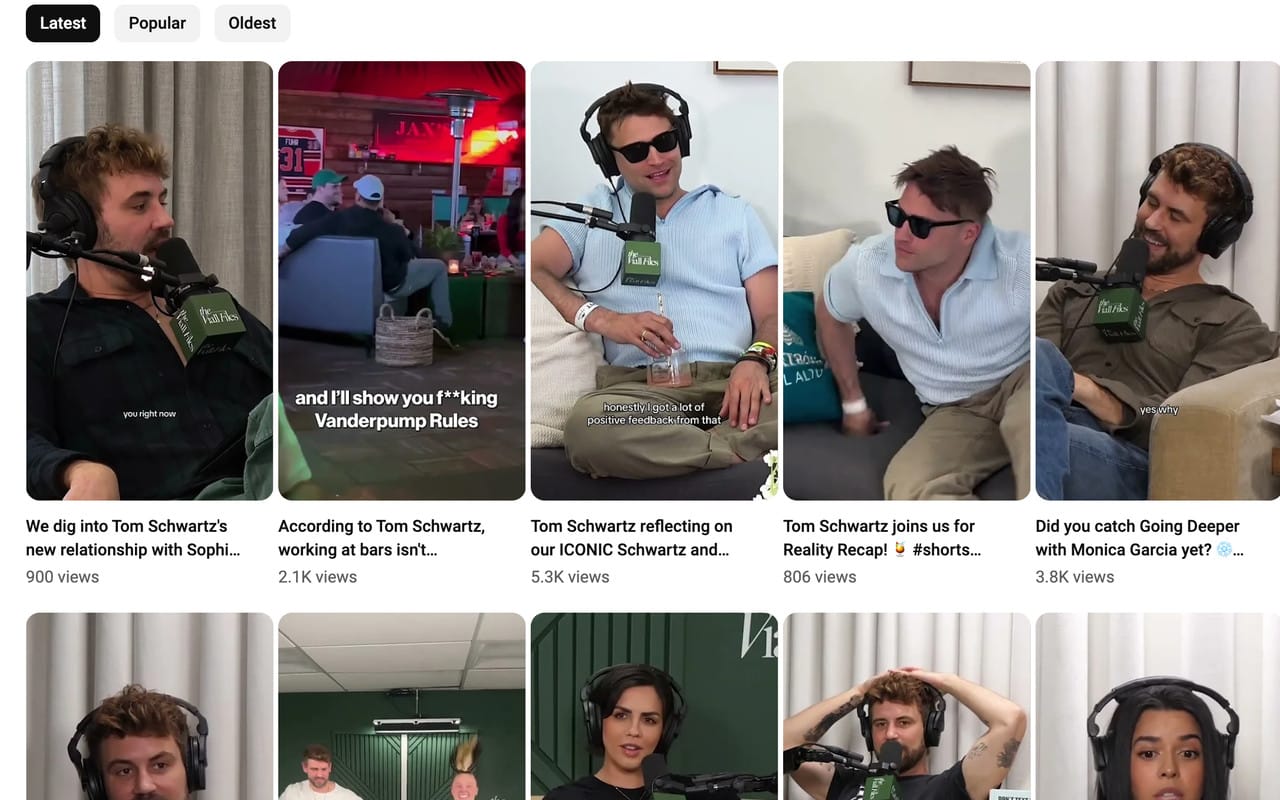
If you have a newsletter, keep your subscribers updated on new releases and exclusive content. Try collaborating with other podcasters or influencers as a way to help you tap into new audiences and boost your visibility.
How to Listen to a Podcast
If you're curious about how you can listen to a podcast, there are several ways to do it.
- Choose a Device
You can listen to podcasts on smartphones, tablets, computers, or smart speakers in your car. - Select a Platform
There are several platforms where podcasts are available, such as Apple Podcasts, Spotify, and Podbean. These platforms have apps that you can download to your device. - Find Podcasts
Search for podcasts by name, genre, or topic in the app’s search bar. Most platforms also offer recommendations based on your listening habits. - Subscribe
Once you find a podcast you like, subscribe to it. You'll receive new episodes as they come out. - Play an Episode
Simply tap on the episode you want to listen to. You can start, pause, rewind, or fast forward through the episode as you wish.
How Do Podcasters Make Money?
From equipment to hosting platforms, podcasts cost money to make. So, after completing the steps to starting a podcast, most creators wonder how to make money with it.
Here are seven ways that you can monetize your podcast.
1. Sponsored Spots
Sponsors are companies or organizations that offer financial compensation or products in return for some airtime on your podcast.
In the podcast, you could mention their brand, discuss their products, or dedicate a whole segment to them. This consistent arrangement helps keep your podcast afloat while allowing sponsors to engage with your audience.
To find sponsors, you can connect with sponsorship brands through podcast networks like Podcorn.
2. Place Ads
Another popular method of making money podcasting is placing ads throughout your show. As a podcaster, you can join a podcast network, similar to finding sponsorships, to integrate ads into your episodes. These networks offer various ad formats, including pre-roll, mid-roll, and post-roll ads and host-read ads that are integrated directly into the content of your podcast.
3. Sell Merch
Many creators want to achieve influencer status, and there's no better way to do so than by selling merch.
Selling branded merchandise, like t-shirts, hats, mugs, and stickers with your podcast's logo or favorite catchphrases, not only offers your listeners a cool way to support your show but also gets the word out in a tangible way. Plus, this strategy helps diversify your income and deepens your connection with your audience as they wear and use items that celebrate your podcast.
To start selling merchandise, choose a few signature items that resonate with your brand, set up an online store – like Whop – or partner with a print-on-demand service, and promote your merchandise to your audience through your podcast and social media channels.
4. Start a Paid Newsletter
Another way to make money with your podcast is by starting a paid newsletter. Your paid newsletter can provide additional information that complements each podcast episode. For example, if your podcast discusses the latest tech news, your newsletter could offer exclusive deals on tech-related products.
Simply choose a platform to host your paid newsletter like, beehiiv, Substack, Ghost or Whop, and set your pricing model, and get to writing.
5. Start a Paid Online Community
While your podcast's listener base grows, you can open an exclusive paid community to deepen engagement and offer more personalized content.
You can include access to special episodes, live Q&A sessions, and direct interaction with you and other community members in your paid community. This creates a more intimate space where your most dedicated listeners can connect, share ideas, and gain additional value from your podcast.
6. Create an eBook for Your Listeners
If your podcast centers around your topic knowledge, you can leverage that expertise into an eBook.
It can serve as a deeper dive into the subjects you discuss on your show, providing your listeners with a structured and comprehensive guide to the topics you're passionate about.
This not only whets their appetite for more content but also establishes them as an authority in their field.
Additionally, an eBook can be a valuable tool for attracting new listeners who are searching for information on your podcast's topics. It can help grow your audience while providing an additional revenue stream.
To design and publish your eBook, organize your ideas and use a platform like Canva to create a layout and cover that reflect your podcast’s branding. Then, select a publishing platform like Amazon Kindle Direct Publishing or Whop to distribute your eBook widely, opening it up to a wider audience.
7. Create a Course
Another way to show your expertise in your chosen podcast topic is to create a course. Of course, you can also create a course on how to start a podcast if your audience is interested in this side hustle idea.
No matter what topic you choose for your course, organize your ideas into a cohesive curriculum your audience can follow easily.
You might also want to add other content mediums, like video or audio, to your course. Make sure to host your course on the right platform, such as Teachable, Kajabi, Thinkific, or Whop.
Explore Podcasting with Whop
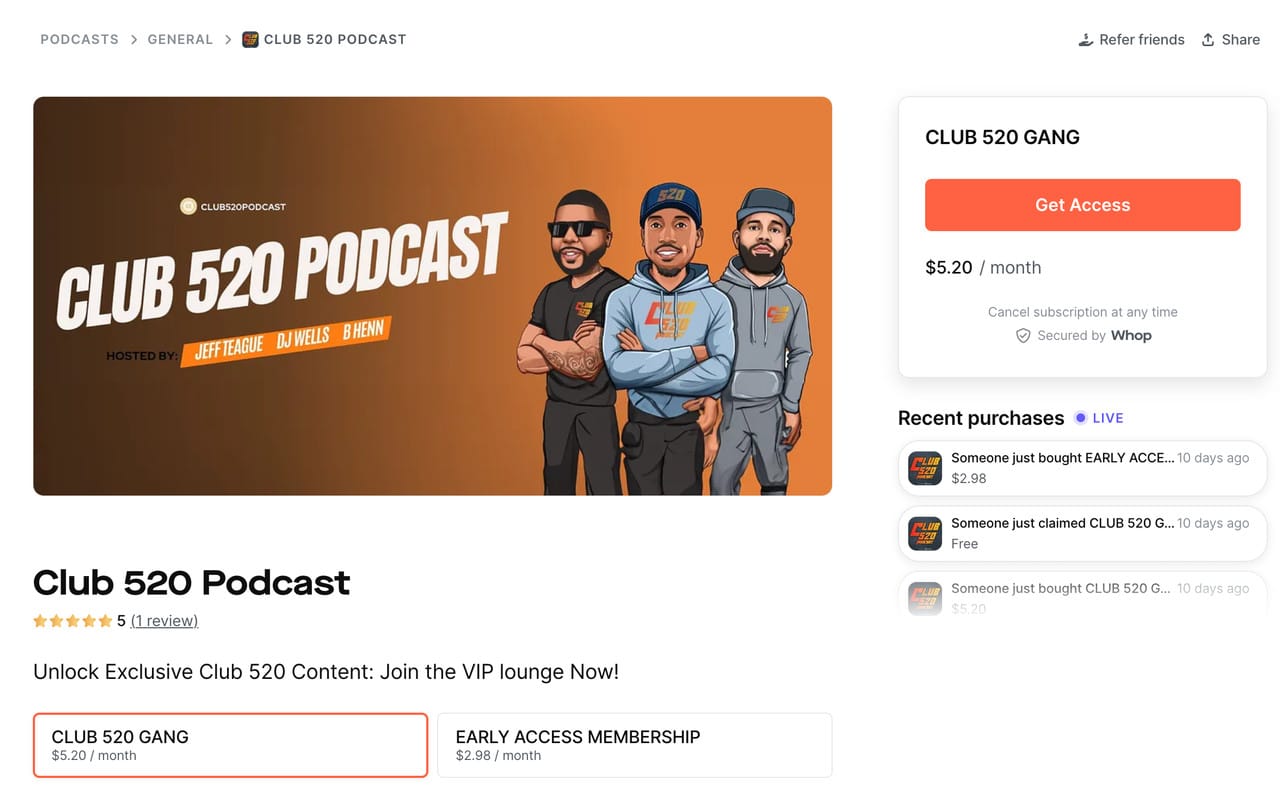
Whop makes it easy to start, publish, and distribute, and ultimately make money with your podcast.
And what makes Whop perfect for a podcaster is the built-in methods to scale your side hustle. From publishing premium content, to starting an online community, to selling your digital products and more, using Whop will help you create a profitable business with your Podcast.
Podcast FAQs
What's the Difference Between a Podcast and an Audio File?
A podcast is a series of audio episodes centered around particular topics or themes. Listeners can subscribe to and download podcasts via podcast platforms. A podcast is structured like a recurring show that regularly updates with new episodes.
An audio file, however, is simply a standalone file containing audio content, such as a song or a recorded lecture, without a podcast's serialized, subscription-based nature.
Are Podcasts Free?
Most podcasts are free to listen to, but some are paid.
Free podcasts are available on various platforms, such as Apple Podcasts, Spotify, and Podbean, where you can stream or download episodes at no cost.
However, some podcasts offer premium content or ad-free listening through subscription services or exclusive memberships, which might require a fee. One example is Luminary, a subscription podcast network. Subscribe to the network for a full library of content.
What is the Best Podcast App?
When searching user-generated content on X (formerly Twitter) and Reddit about this question, the top podcast apps are:
- Best: Pocket Casts
- Overcast
- Spotify Premium
- Podcast Addict
What's a Podcast RSS Feed?
An RSS feed for a podcast is a file that automatically updates and includes all the important information about your podcast and its episodes.
When you upload a new episode, this feed updates and sends the latest content straight to podcast directories and your subscribers. Think of it as a bridge connecting your podcast to listeners across various platforms like Apple Podcasts, Spotify, and others, ensuring they get all your latest episodes the moment they're published.
What's a Live Podcast?
A live podcast is like a live radio show, but you record the episode with a live audience tuning in virtually.
Some podcasters love the vibe of going live for every episode, bringing a real-time interactive feel to their show. Others might save the live experience for special events or make it a once-a-month treat, adding a bit of excitement for their listeners.
The Dollop is a popular example of a paid live podcast event. It's an American comedy history podcast where comedian Dave Anthony shares tales from American history with his friend and fellow comedian Gareth Reynolds, who typically has no prior knowledge of the topic at hand.
What's a Podcast Mixer?
Also called an audio mixer, it combines multiple audio signals into a single output. This is useful for blending music, dialogue, sound effects, or any other audio you might have in your podcast. While mixing audio can be complex, it's crucial for achieving high-quality sound in your episodes so that all elements are well-balanced and clear.
